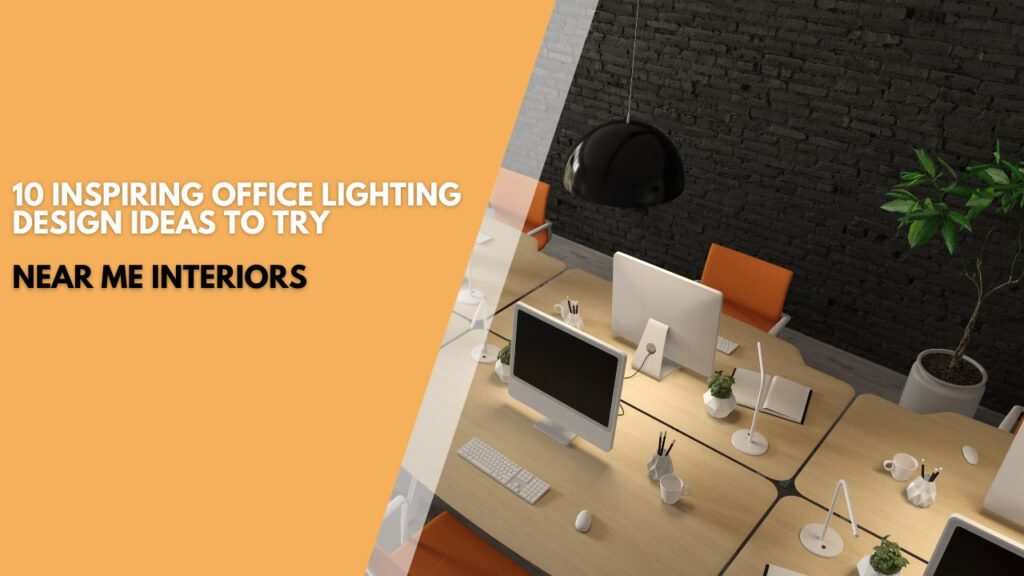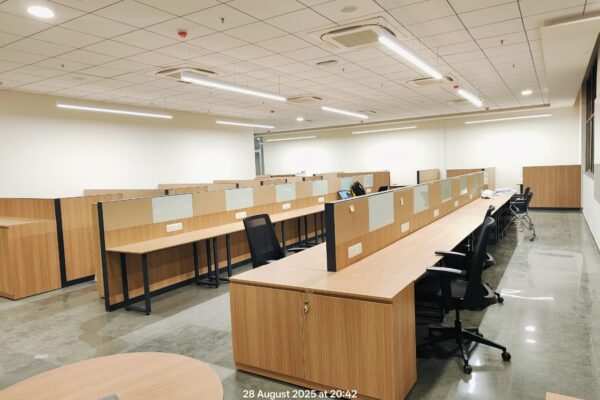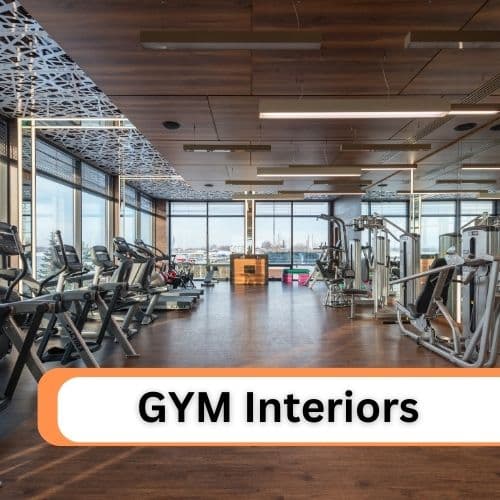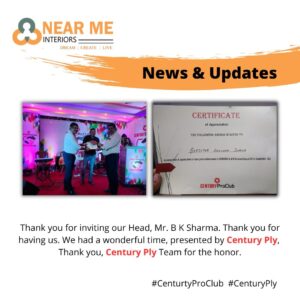Lighting is more than just a necessity; it’s a powerful design element that shapes how we work, feel, and connect in the office. The right lighting can transform a dull, uninspired workspace into a vibrant hub of creativity and collaboration. It can boost focus, encourage relaxation, and even reinforce a company’s brand identity.
At Near Me Interiors, the trusted and best office interior designers, we believe that lighting design is a critical tool for creating inspiring environments where people truly thrive. These 10 innovative office lighting design ideas will elevate your workspace, making it both visually appealing and highly functional.
The Science & Psychology Behind Office Lighting
Before jumping into design ideas, it’s important to understand why lighting matters so much.
Lighting impacts our:
- Visual comfort: Poor lighting strains the eyes and causes headaches.
- Cognitive performance: The right brightness and color temperature help keep employees alert and productive.
- Emotional well-being: Lighting affects mood and can either energize or calm.
- Circadian rhythms: Exposure to appropriate lighting throughout the day supports healthy sleep-wake cycles.
Key technical points to consider:

- Lux levels: Aim for 300–500 lux in workspaces to reduce eye fatigue.
- Color temperature: Cool white light (4000K–6500K) promotes alertness, while warm white light (2700K–3000K) creates a cozy, calming effect.
- Glare and flicker: Avoid harsh, flickering lights that cause discomfort and distraction.
10 Inspiring Office Lighting Design Ideas
Smart LED Lighting Systems
Smart LED systems allow you to control brightness, color temperature, and even scheduling with mobile apps or voice assistants. Benefits include:
- Personalization: Employees can adjust lighting to match their needs.
- Automation: Lights turn on/off or dim automatically based on occupancy or natural light levels.
- Energy efficiency: LED systems use up to 90% less energy than traditional lighting.
Why try it?
It offers flexibility and supports individual comfort, boosting both wellness and productivity.
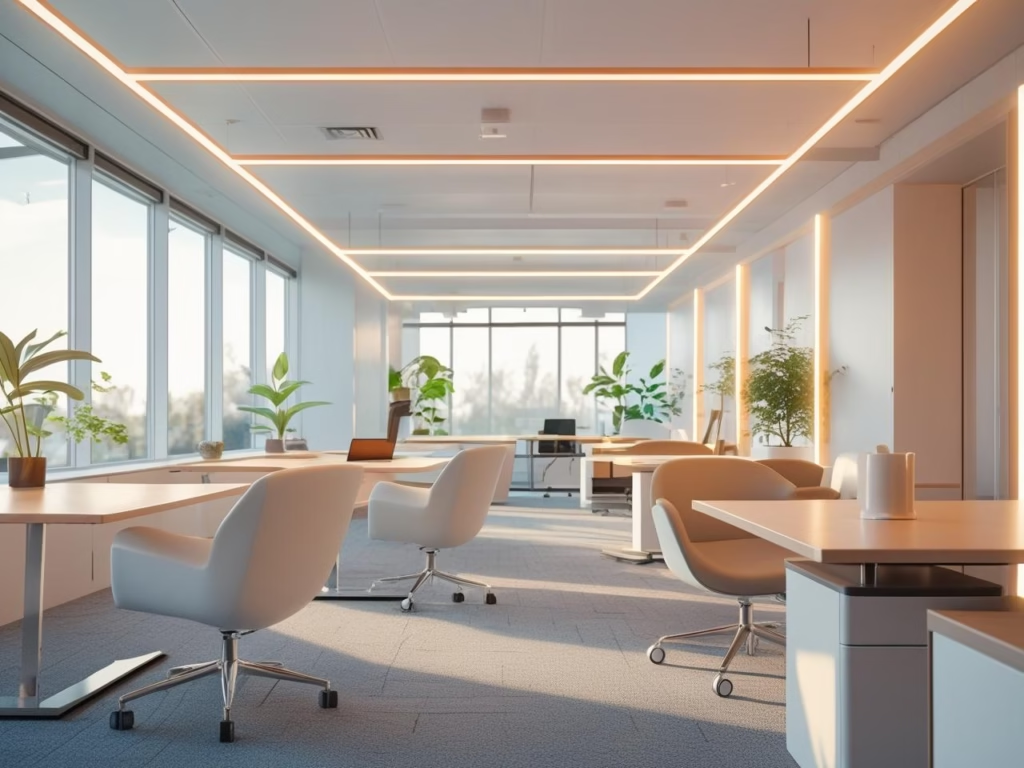
Biophilic Lighting
Inspired by nature, biophilic lighting aims to mimic daylight and natural changes throughout the day. Features include:
- Dynamic white lighting that changes intensity and color temperature like sunlight.
- Fixtures designed with organic shapes and natural materials.
- Integration with natural daylight for a seamless indoor-outdoor feel.
Why try it?
Biophilic lighting reduces stress, improves mood, and strengthens our natural connection to the outdoors — key for employee well-being.
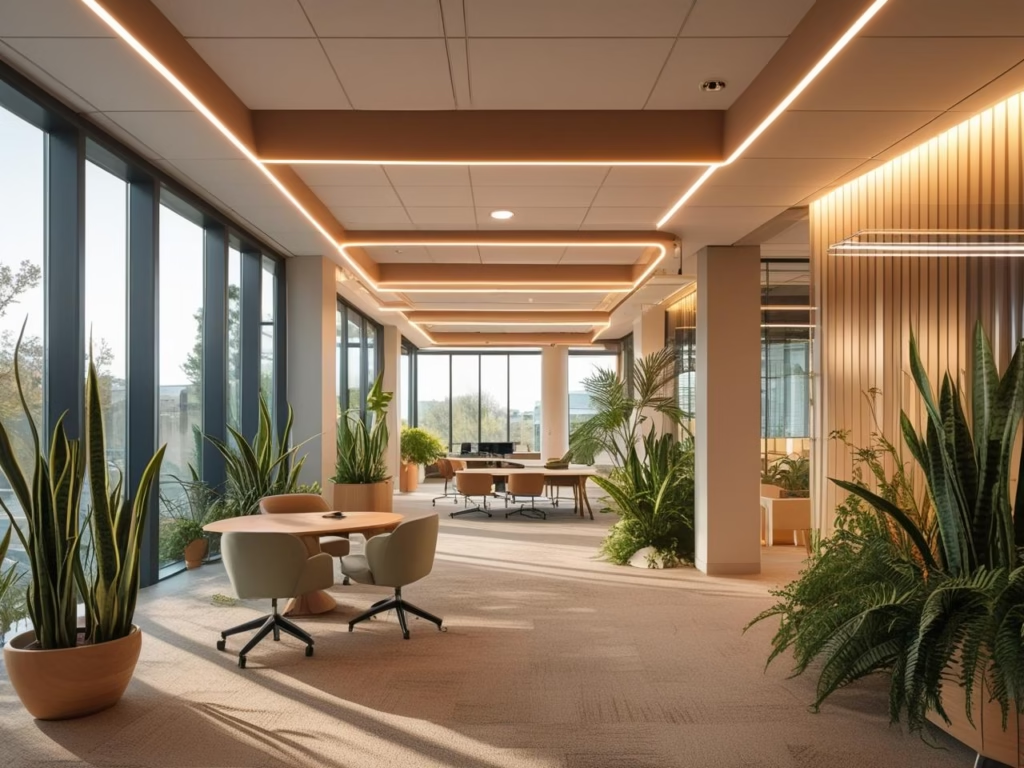
Integrated Architectural Lighting
Rather than adding standalone fixtures as an afterthought, architectural lighting becomes part of the space’s structure. Examples include:
- Cove lighting for soft ceiling glows.
- Wall grazing lights to highlight textures and architectural elements.
- Built-in linear lighting for clean, minimalist lines.
Why try it?
This approach delivers a sleek, cohesive design aesthetic and enhances spatial depth without clutter.
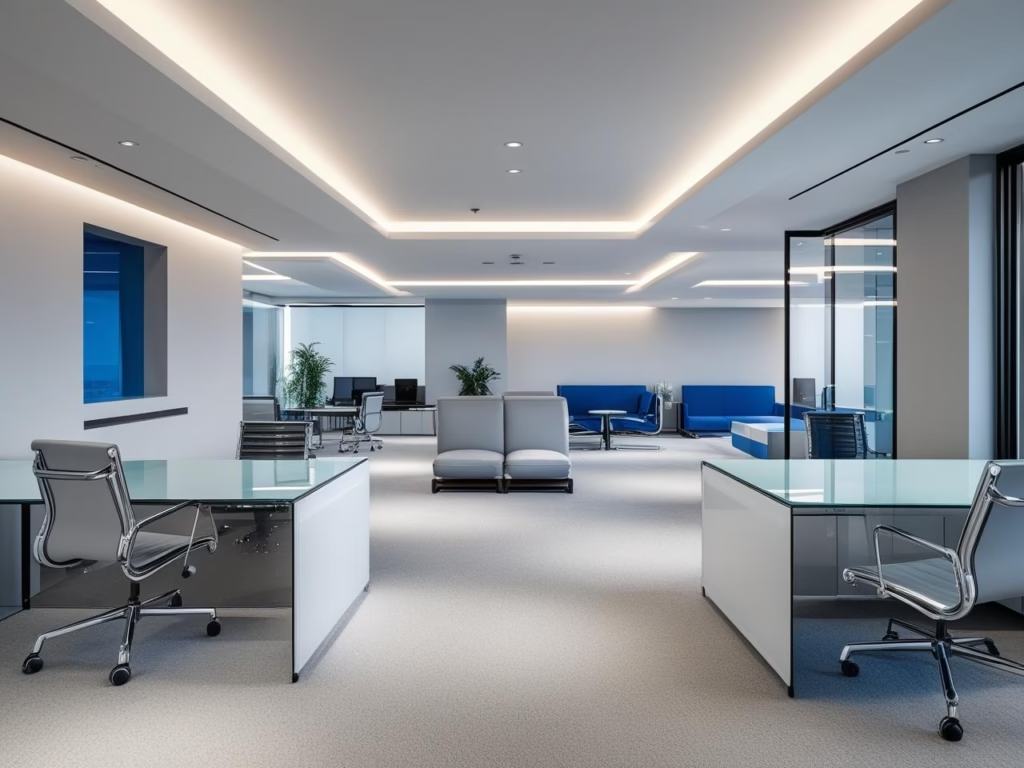
Task-Focused Lighting
Dedicated lighting for specific tasks ensures proper visibility and reduces eye strain. Solutions include:
- Adjustable desk lamps.
- Under-cabinet lighting for work surfaces.
- Track lights or articulated arms for drawing or model work.
Why try it?
Focused lighting improves accuracy and comfort, especially during detail-heavy tasks.
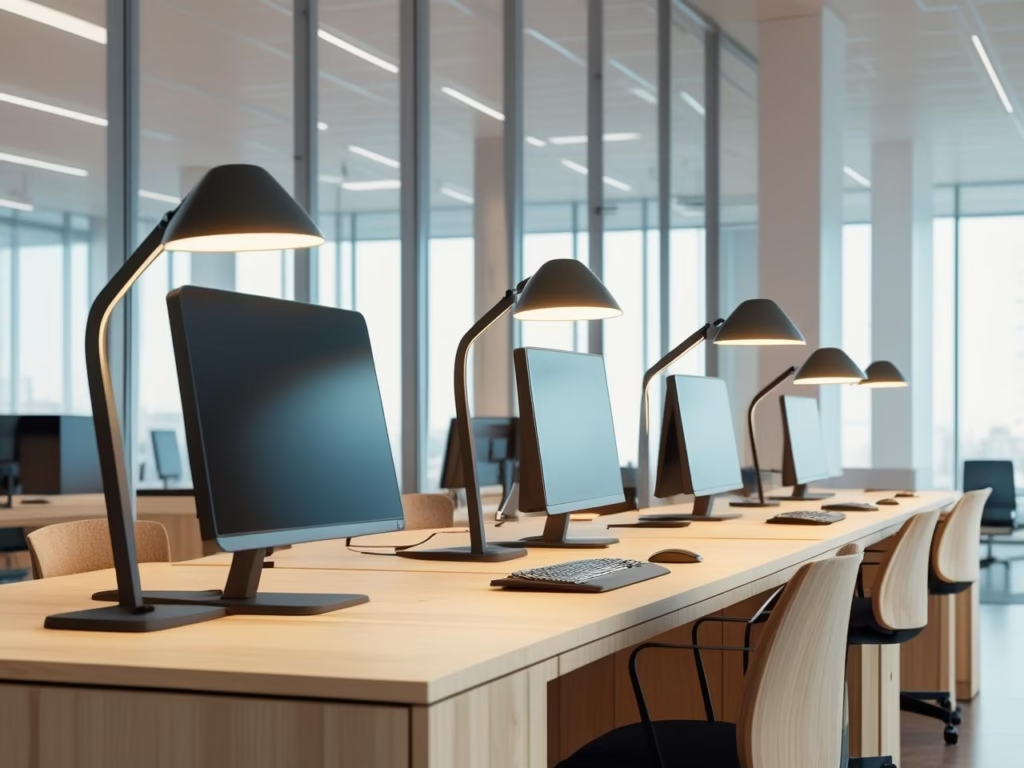
Interactive & Adaptive Lighting
Lighting that responds to human presence or movement adds an element of play and dynamism. Features include:
- Motion sensors that adjust brightness automatically.
- Color-changing fixtures that react to movement.
- Pathway lights that illuminate as people walk by.
Why try it?
It keeps the workspace engaging and fun, encouraging movement and interaction.
Color-Tunable Systems
These systems allow you to switch between cooler tones for focused tasks and warmer tones for creative sessions or relaxation. Benefits include:
- Support for various work modes (e.g., brainstorming vs. quiet focus).
- Ability to simulate natural daylight shifts throughout the day.
- Improved employee mood and energy levels.
Why try it?
It aligns lighting with different activities, enhancing overall office functionality.
Statement Pendant & Feature Lighting
Bold, eye-catching pendants make a big impact. Options range from:
- Sculptural or geometric shapes.
- Natural-inspired designs like branch or wave forms.
- Vibrant colors or minimalist monochrome pieces.
Why try it?
They become conversation starters, showcase brand personality, and add an artistic touch to functional spaces.
Acoustic-Integrated Lighting
Combining lighting with sound-absorbing panels solves two problems at once in open office layouts. Examples include:
- Pendant lights with felt or acoustic foam finishes.
- Ceiling baffles with integrated LED strips.
- Partition-mounted lighting with sound control features.
Why try it?
This hybrid solution improves both lighting quality and acoustics, fostering a more focused and comfortable work environment.
Maximizing Natural Light
Utilizing daylight isn’t just about energy savings — it boosts health and morale. Strategies include:
- Large windows and skylights.
- Light shelves and reflective surfaces to spread daylight deeper into the space.
- Solar tubes to bring sunlight into windowless areas.
Why try it?
Natural light reduces reliance on artificial sources, supports circadian rhythms, and makes spaces feel more open and inviting.
OLED and Next-Generation Panels
OLED panels are thin, flexible, and provide soft, uniform light without glare. Advantages include:
- Minimal heat output and energy efficiency.
- Unique design possibilities (e.g., curved walls or floating panels).
- Environmentally friendly and mercury-free.
Why try it?
They add a futuristic touch to offices while creating a soothing, comfortable lighting environment.
Tailoring Lighting to Different Office Zones
Reception areas: Use accent lighting to highlight brand elements and artwork, creating a memorable first impression.
Workstations: Focus on task lighting with appropriate lux levels to minimize fatigue and improve productivity.
Meeting rooms: Flexible, tunable lighting setups to suit different meeting formats, from presentations to brainstorming.
Breakout spaces: Warm, cozy lighting to promote relaxation and casual interaction.
Corridors & pathways: Continuous, evenly distributed lighting for safe, easy navigation.
Exteriors: Combine aesthetic facade lighting with motion-sensor security lights for both style and safety.
Practical Tips for Choosing & Implementing Office Lighting
- Conduct a detailed lighting audit to understand your current setup and needs.
- Involve employees in testing and feedback to improve satisfaction.
- Combine natural and artificial lighting for balanced, energy-efficient solutions.
- Choose future-proof, upgradable systems to adapt to evolving work styles.
- Partner with an expert design team to seamlessly align lighting with your brand identity and workspace vision.
Conclusion
Lighting isn’t just about illumination — it’s about creating spaces where people feel energized, focused, and inspired. By thoughtfully integrating modern lighting technologies and design ideas, you can transform your office into a place employees genuinely enjoy working in.
Near Me Interiors, as one of the top Commercial Interior Designers, we specialize in designing workspaces that blend aesthetics, functionality, and well-being. If you’re ready to reimagine your office lighting and overall environment, we’d love to help you craft a space that empowers your team to thrive.

